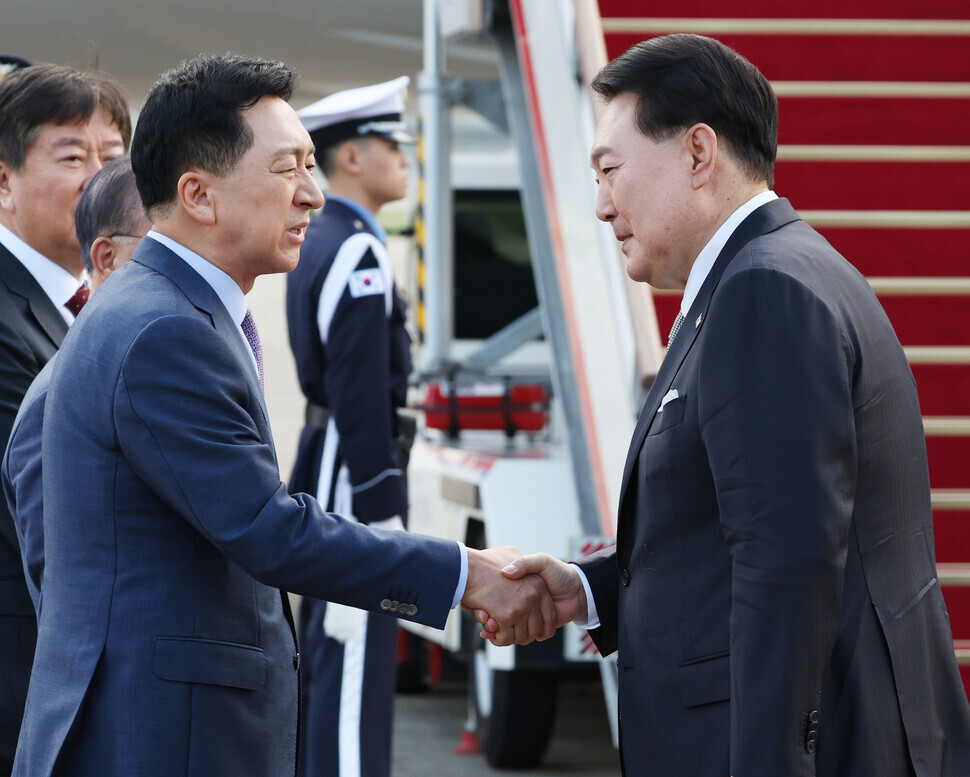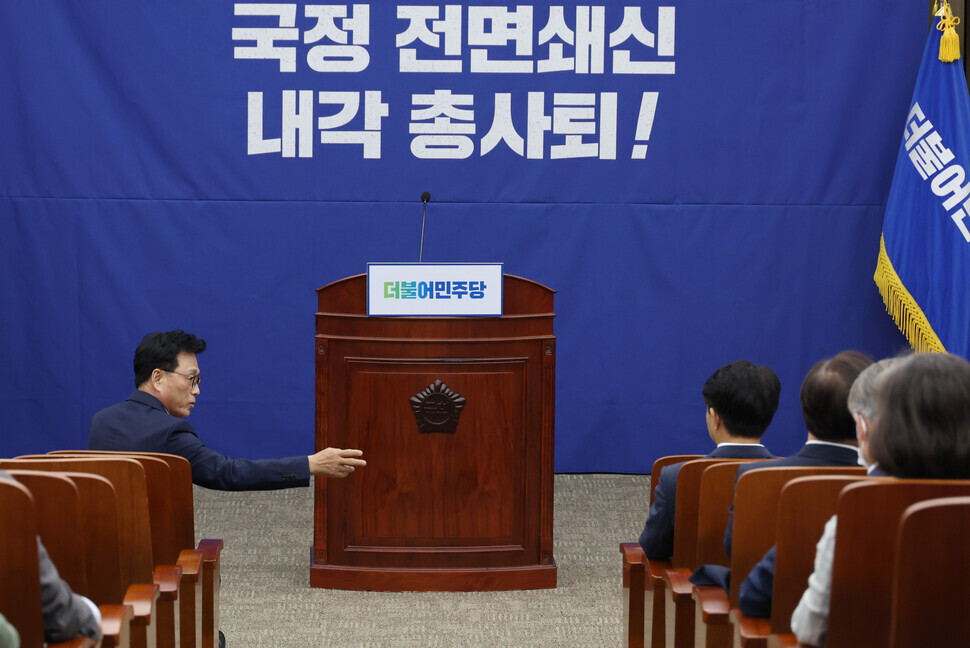hankyoreh
Links to other country sites 다른 나라 사이트 링크
Confrontation over compromise: How S. Korea’s ruling, opposition camps became locked in conflict

The dramatic confrontation between South Korea’s ruling and opposition camps, which has been ongoing for a year and a half since the launch of the Yoon Suk-yeol administration, seems to have reached the point of no return following Democratic Party leader Lee Jae-myung’s hunger strike and prosecutors’ second request for an arrest warrant for him.
As the two sides have been unable to find common ground due to their views of the other and their own demands, and as the general election scheduled for April is fast approaching, it appears likely that their showdown will drag on for an extended period of time.
The primary responsibility for this dramatic confrontation lies with Yoon and the People Power Party (PPP).
Since winning by a razor-thin margin of 0.73 percentage points in last year’s presidential election against the Democratic Party’s Lee Jae-myung, Yoon has not acknowledged the opposition leader as a partner he must engage in dialogue with. Not once since Yoon took office has a meeting between the president and Lee Jae-myung taken place.
“Yoon strongly believes that a meeting with a suspected criminal is not necessary,” explained a key official from the ruling camp.
Although winning the opposition’s cooperation is essential due to its majority status at the National Assembly, Yoon has blatantly revealed his animosity toward the Moon Jae-in administration and the Democratic Party, labeling them “anti-state forces.”
Even as Lee Jae-myung has been on hunger strike for 19 days and counting, Yoon has made no public response or reaction.
Plus, Yoon requested ministers to be “warriors” for his administration. During a Cabinet meeting on Aug. 29, Yoon told ministers to “not hesitate to be criticized and fight proactively,” adding, “You are here to fight.” Reshuffling his Cabinet on Wednesday, he appointed militant figures like Shin Won-sik and Yu In-chon as his nominees for minister of national defense and minister of culture, sports and tourism, respectively.
The prosecution service and the Board of Audit and Inspection have launched full-scale investigations and inspections regarding Shin Hak-lim’s interview of Kim Man-bae for Newstapa as well as the allegation that the Moon administration fabricated statistical data, taking direct aim at Yoon’s predecessor.

By completely denying the opposition’s existence, the ruling camp is treating it as an object to overthrow, rather than compromise with.
Unable to stand on its own, the ruling party did not fulfill its role as a buffer at the National Assembly. Regarding Shin Hak-lim’s interview of Kim Man-bae for Newstapa, PPP leader Kim Gi-hyeon remarked on Sept. 11 that it amounts to a case of “carefully premeditated first degree murder.” Early in Lee Jae-myung’s hunger strike on Sept. 7, Kim Gi-hyeon sarcastically asked whether the opposition leader was really on a hunger strike, suggesting that it was an act.
The Democratic Party, which holds the majority at the National Assembly, was not able to focus its power on reigning in the government and the ruling party, sidetracked by internal dispute concerning its leader’s judicial liabilities. After Lee Jae-myung took over party leadership five months into his defeat in the presidential election, the Democratic Party pushed for the impeachment of Lee Sang-min, the nominee for interior and safety minister at the time, while the Yoon administration was in hot water for its response to the Halloween crowd crush in Itaewon, but the motion was rejected by the Constitutional Court.
Meanwhile, the ethics of the leading opposition party have become tarnished due to the allegation that bribes were distributed ahead of its national convention, as well as the allegation that a lawmaker of the party, Kim Nam-kuk, speculated in cryptocurrency.
At the same time, the influence of hard-line supporters has grown even more within the Democratic Party. Despite concerns raised within the party as well as without that it is going overboard with demands for independent prosecutors and government inspections, the party decided to demand special prosecutors to investigate alleged interference in an inquiry into the death of a marine corporal in addition to calling for government inspections regarding a route change for the planned Seoul-Yangpyeong expressway, the dismissal of board members of public broadcasters, the jamboree debacle, and the Osong underpass tragedy.
The problem is that there appears to be no way out from this face-off between the ruling and opposition camps. Next year’s general election is especially likely to deepen the conflict.
“With the approach of an election, parties should be expanding their bases to include moderates, but things are going in the opposite direction right now,” commented Choi Chang-ryul, a professor at Yong In University. “Ruling and opposition lawmakers will inevitably remain conscious of their support base until next year’s general election, and since they have to be nominated for candidacy, there is no space for moderate voices to survive.”
Predicting that the two sides’ confrontation will “continue until not just next year’s general election but the presidential election,” Incheon National University professor Lee Jun-han asked, “How would cooperative governance be possible when the ruling and opposition camps are not acknowledging each other’s existence?”
“The livelihood of the public will be put on the back burner while politics barrels toward the election,” he added.
By Seo Young-ji, staff reporter
Please direct questions or comments to [english@hani.co.kr]

Editorial・opinion
![[Column] Life on our Trisolaris [Column] Life on our Trisolaris](https://flexible.img.hani.co.kr/flexible/normal/500/300/imgdb/original/2024/0505/4817148682278544.jpg) [Column] Life on our Trisolaris
[Column] Life on our Trisolaris![[Editorial] Penalties for airing allegations against Korea’s first lady endanger free press [Editorial] Penalties for airing allegations against Korea’s first lady endanger free press](https://flexible.img.hani.co.kr/flexible/normal/500/300/imgdb/original/2024/0502/1817146398095106.jpg) [Editorial] Penalties for airing allegations against Korea’s first lady endanger free press
[Editorial] Penalties for airing allegations against Korea’s first lady endanger free press- [Editorial] Yoon must halt procurement of SM-3 interceptor missiles
- [Guest essay] Maybe Korea’s rapid population decline is an opportunity, not a crisis
- [Column] Can Yoon steer diplomacy with Russia, China back on track?
- [Column] Season 2 of special prosecutor probe may be coming to Korea soon
- [Column] Park Geun-hye déjà vu in Yoon Suk-yeol
- [Editorial] New weight of N. Korea’s nuclear threats makes dialogue all the more urgent
- [Guest essay] The real reason Korea’s new right wants to dub Rhee a founding father
- [Column] ‘Choson’: Is it time we start referring to N. Korea in its own terms?
Most viewed articles
- 1New sex-ed guidelines forbid teaching about homosexuality
- 2OECD upgrades Korea’s growth forecast from 2.2% to 2.6%
- 360% of young Koreans see no need to have kids after marriage
- 4[Column] Life on our Trisolaris
- 5[Guest essay] Maybe Korea’s rapid population decline is an opportunity, not a crisis
- 6Months and months of overdue wages are pushing migrant workers in Korea into debt
- 7Presidential office warns of veto in response to opposition passing special counsel probe act
- 8Inside the law for a special counsel probe over a Korean Marine’s death
- 9Two lung cancer deaths at Samsung Electronics deemed occupational in nature
- 10Korean government’s compromise plan for medical reform swiftly rejected by doctors